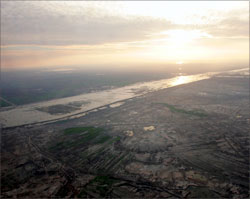Iraks sumpe og marsklande

I betragtning af, at vi gang på gang må konstatere, at Iraks forhold
er i blodig uorden efter den amerikansk-ledede invasion og besættelse,
bør vi vel også her ile med at viderebringe, når der rent faktisk sker
noget godt; i dette tilfælde økologisk og måske med tiden etnografisk,
i det sydlige Irak. Således
Aljazeera:
A Japanese-funded UN project launched a year ago has used the internet
and eco-friendly technology to restore the Middle East's main wetland
area, which is believed to be the basis for the biblical Garden of
Eden.
Shia fighters hid in the labyrinth of waterways and floating reeds
after Saddam's Sunni-dominated regime crushed a Shia insurrection
after the 1991 Gulf War.
In retaliation, Saddam diverted waterways and burned down the
reedbeds, reducing the 9000 square km of permanent wetlands in the
1970s to just 760 square km when his government was toppled in 2003.
The UN Environment Programme (UNEP) said its satellite images showed
that 37% of the permanent wetlands was now restored, with the figure
nearing 50% in the spring before water evaporated with the summer
heat.
Men skønt dette initiativ måske gør meget godt, bør besættelsesmagten
med USA i spidsen stadig passe på: Marskaraberne var indædte og
uforsonlige væbnede modstandere af Saddam, og medmindre de ligefrem
udryddes, er der ingen grund til at tro. de skulle komme til
at elske den fremmede besættelse mere. Vi læser i
The
Guardian:
For 13 years he was a defiant symbol of Iraqi resistance. Hunted in
vain by Saddam Hussein's militia, the legendary guerrilla fighter Abu
Hattem fought an extraordinary campaign against the Iraqi regime from
his secluded bases in the poisoned marshland of southern Iraq.
Known as the Lord of the Marshes, his exploits earned him a reputation
that is a cross between Robin Hood and Lawrence of Arabia, with tales
of suicidal missions and narrow escapes.
Western journalists tried for years to track him down during the
guerrilla years, visiting Iranian border towns in the hope of finding
him. They had no more success than the Iraqi secret police. Now that
Saddam has fallen, the rebel leader has finally emerged from hiding
and has given his first interview to the Guardian.
Abu Hattem said many of the legends about him were true. He fought
what he calls The War of the Fleas with small groups, continually on
the move, a constant source of irritation to the Iraqi army. He could
not defeat them in open battle but he left them nervous about entering
the marshes.
(...)
He hoped the British and US forces "will go soon". He expected this to
happen when security was established - which it has been - and local
government set up.
He was alarmed by a US proposal last week to maintain four permanent
bases in Iraq. "I have the same feelings about this idea as would
every single guerrilla fighter round the world who does not want a
foreign power over him."
Så ja - for både økologer og urbefolkning er der gode nyheder. Om det
også ender med at være gode nyheder for en besættelsesmagt, der
burde have pakket deres kufferter for efterhånden længe siden,
er en anden sag.
[ agger, Wed 24 Aug, :19:34:
/politik] -
kommentar(er) -
link
 I betragtning af, at vi gang på gang må konstatere, at Iraks forhold
er i blodig uorden efter den amerikansk-ledede invasion og besættelse,
bør vi vel også her ile med at viderebringe, når der rent faktisk sker
noget godt; i dette tilfælde økologisk og måske med tiden etnografisk,
i det sydlige Irak. Således Aljazeera:
I betragtning af, at vi gang på gang må konstatere, at Iraks forhold
er i blodig uorden efter den amerikansk-ledede invasion og besættelse,
bør vi vel også her ile med at viderebringe, når der rent faktisk sker
noget godt; i dette tilfælde økologisk og måske med tiden etnografisk,
i det sydlige Irak. Således Aljazeera:
